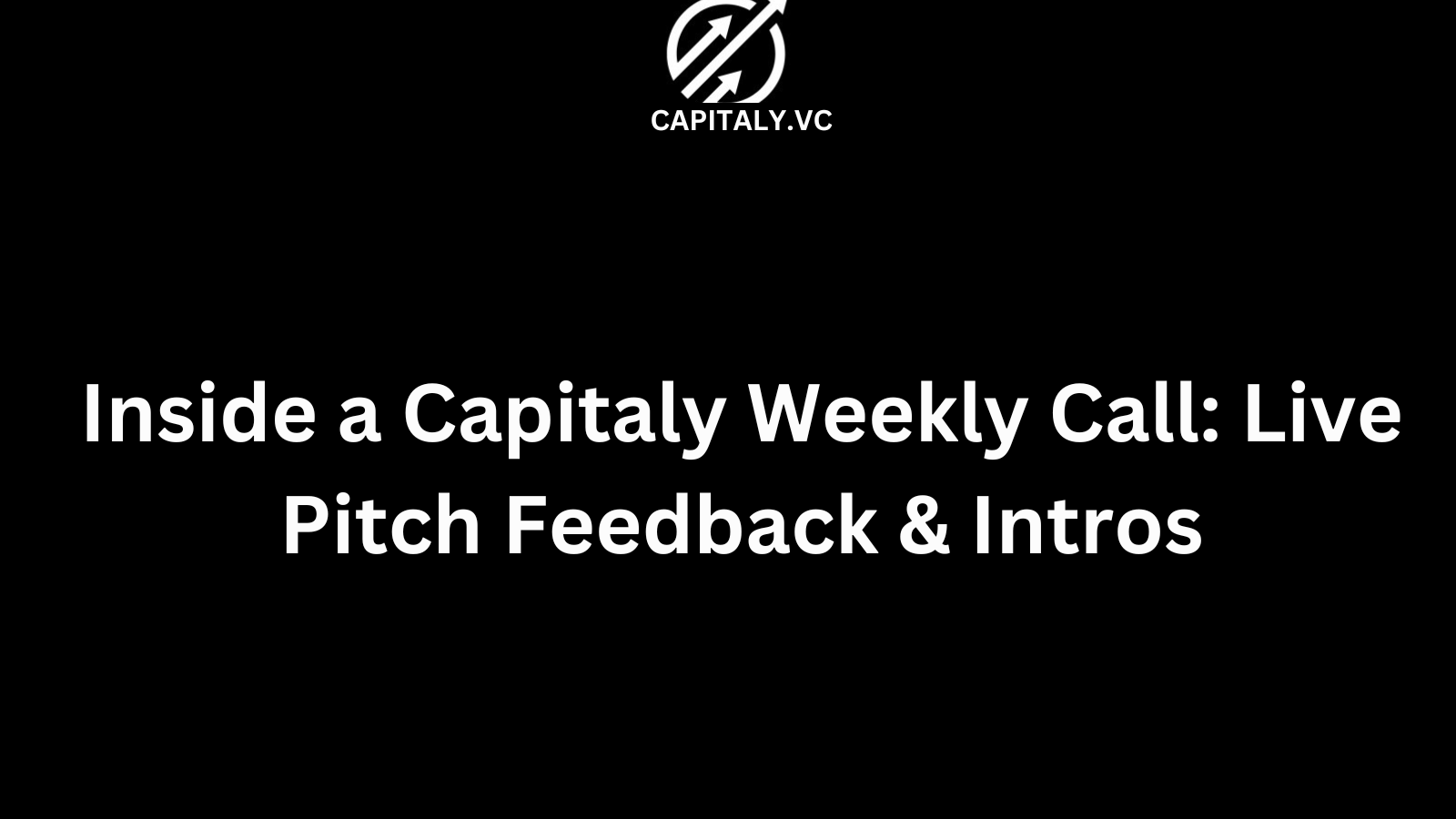Inside a Capitaly Weekly Call: Live Pitch Feedback & Intros
Inside a Capitaly Weekly Call: Live Pitch Feedback & Intros

If you’ve ever wondered what actually happens inside a Capitaly Weekly Call, you’re not alone.
Every week, dozens of founders join the live Zoom room—some to pitch, some to get feedback, some just to lurk and learn.
But what makes these calls different isn’t the deck critiques or investor intros.
It’s the founder-first, no-BS atmosphere—a live, tactical session designed to help you raise faster.
In this post, I’ll walk you through exactly what happens in a Capitaly Weekly Call, from pitch feedback and intros to what founders say after they hang up.

What Happens in a Capitaly Weekly Call?
Each Capitaly Weekly Call is part pitch lab, part investor warm-up, part founder therapy.
Here’s how it works:
- Step 1: Founder Signup
- Founders who’ve joined Capitaly.vc get access to weekly calls.
- You fill in a quick form with your deck or idea, and we slot you in.
- Step 2: The Call Itself
- We cap calls at ~5 pitches.
- Each founder gets 5–7 minutes of pitch + live feedback.
- Other founders chime in with questions, VCs occasionally join silently or visibly.
- Step 3: The Feedback
- You’ll hear things like: “That problem statement’s too soft,” or “This sounds like a vitamin, not a painkiller.”
- We don’t sugarcoat, but we’re here to help you win.
- Step 4: The Intros
- If your pitch is tight and aligned with one of our 300+ angels and micro-VCs, we make intros—right from the call or after.
- Intros aren’t promised—they’re earned.
Why Founders Love It
Founders consistently say:
- “Most helpful feedback I’ve gotten—more useful than any accelerator call.”
- “You’re not trying to impress VCs—you’re trying to communicate like a human.”
- “Capitaly calls are like YC office hours, minus the gatekeeping.”
What Kinds of Startups Pitch?
In the last 30 days alone:
- AI-native startups pitching agent infrastructure, multimodal workflows, or vertical GPTs.
- Bootstrapped SaaS founders seeking to raise their first $500K after reaching PMF.
- Ex-FAANG operators launching bold new ventures and validating investor narratives.
This isn’t just early idea feedback.
It’s a serious fundraising gym.
What Kind of Feedback Do You Get?
Let’s be blunt: this isn’t Demo Day theater.
We tell you:
- What your deck actually communicates
- Whether investors will understand the market sizing
- If your traction claims raise red flags
- If you’re underselling your moat
- If your CAC/LTV isn’t investor-grade
You’ll walk away with:
- Clarity on your positioning
- Brutal honesty
- Suggestions to reframe your pitch in investor language
For more on pitch crafting, see our blog post: The Ultimate Guide to Pitch Decks for Startup Fundraising
How Intros Work
Capitaly’s investor network isn’t a Google Sheet.
It’s an algorithmic CRM built around founder needs and investor fit.
- You pitch
- We tag the opportunity
- If it fits a thesis, we intro
We don’t spam investors.
We connect when there’s a high match rate.
What Happens After the Call?
After the call:
- Founders get a private email summary with:
- Feedback takeaways
- Intro status (if any)
- Suggested blog posts or pitch templates
Some even get access to our AI-powered follow-up tools to polish their cold emails or investor updates.
20 Questions We Often Get on Capitaly Weekly Calls
1. How do I know if I’m ready to pitch on a Capitaly Call?
If you have a problem statement, solution, and rough traction, you’re ready.
2. What if I don’t have a deck?
We’ve seen founders close pre-seed without one.
But we recommend having at least 5–6 slides.
Check out our pitch deck template →
3. What kinds of investors are in the Capitaly network?
Micro-VCs, angels, and operators.
Mostly seed and pre-seed focused.
4. Do investors join the live calls?
Sometimes, yes.
Other times, they watch pitch clips later via our CRM.
5. What industries get the most traction?
AI-native SaaS, infra, fintech, devtools, and vertical platforms.
6. Is Capitaly industry-agnostic?
Mostly—but we skew toward scalable tech and bold founders.
7. How many founders pitch per session?
Typically 4–5.
8. Can I get feedback without pitching?
Yes—lurkers welcome.
9. Are these calls recorded?
Privately, for internal feedback only.
10. Is there a cost?
Nope.
11. What’s the difference between a Capitaly Call and a Demo Day?
Demo Day is a performance.
Capitaly Calls are practice that actually improves your pitch.
12. What’s the success rate of getting intros?
Depends on:
- How clearly you pitch
- Market fit
- Stage and traction
13. Can I attend more than once?
Absolutely.
Iterate, improve, come back.
14. What’s the biggest mistake founders make in these calls?
Not defining a crisp problem that investors care about.
15. Can I join anonymously?
Yes, but you won’t get feedback or intros.
16. What happens if my pitch goes badly?
We’ll help you fix it.
17. Are Capitaly intros warm?
Yes, always tailored and direct.
18. What happens after I get an intro?
You own it—just don’t blow it.
Use our investor follow-up email templates to stand out.
19. Can I pitch if I’m not raising yet?
Yes—just be clear about your stage and goals.
20. Where do I sign up?
Subscribe to Capitaly.vc Substack
Conclusion
A Capitaly Weekly Call isn’t just a pitch practice.
It’s where founders get real about their raise, fix their narrative, and walk away sharper—sometimes with intros that change everything.
If you’re raising (or about to), make this part of your weekly rhythm.
Join a Capitaly Weekly Call to get live pitch feedback and warm investor intros.
Subscribe to Capitaly.vc Substack (https://capitaly.substack.com/) to raise capital at the speed of AI.


.png)